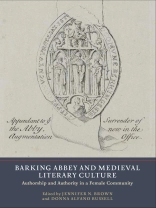[An] admirable collection. . For anyone interested in what Wogan-Browne calls 'the historiography of female community’, nuns’ libraries and literacy, and Barking abbey itself, this first-class collection of essays is essential reading. CATHOLIC HISTORICAL REVIEW
Essays on the texts produced at Barking Abbey – one of the most important centres for writings in the Middle Ages.
Barking Abbey (founded c. 666) is hugely significant for those studying the literary production by and patronage of medieval women. It had one of the largest libraries of any English nunnery, and a history of women’s education from the Anglo-Saxon period to the Dissolution; it was also the home of women writers of Latin and Anglo-Norman works, as well as of many Middle English manuscript books.
The essays in this volume map its literary history, offering a wide-ranging examination of its liturgical, historio-hagiographical, devotional, doctrinal, and administrative texts, with a particular focus on the important hagiographies produced there during the twelfth century. It thusmakes a major contribution to the literary and cultural history of medieval England and a rich resource for the teaching of women’s texts.
Professor JENNIFER N. BROWN teaches at Marymount Manhattan College; Professor DONNA ALFANO BUSSELL teaches at University of Illinois-Springfield.
Contributors: Diane Auslander, Alexandra Barratt, Emma Bérat, Jennifer N. Brown, Donna A. Bussell, Thelma Fenster, Stephanie Hollis, Thomas O’Donnell, Delbert Russell, Jill Stevenson, Kay Slocum, Lisa Weston, Jocelyn Wogan-Browne, Anne B. Yardley
Spis treści
Introduction: Barking’s Lives, the Abbey and its Abbesses
Barking’s Monastic School, Late Seventh to Early Twelfth Century: History, Saint Making and Literary Culture – Stephanie Hollis
The Saint-Maker and the Saint: Hildelith Creates Ethelburg – Lisa M.C. Weston
Goscelin of Saint-Bertin and the Translation Ceremony for Saints Ethelburg, Hildelith, and Wulfhild – Kay Slocum
’The Ladies Have Made Me Quite Fat’: Authors and Patrons at Barking Abbey – Thomas O’Donnell
’Sun num n’i vult dire a ore’: Identity Matters at Barking Abbey – Delbert W. Russell
’Ce qu’ens li trovat, eut en sei’: On the Equal Chastity of Queen Edith and King Edward in the Nun of Barking’s
La Vie d’Edouard Le Confesseur – Thelma Fenster
Body, Gender, and Nation in the Lives of Edward the Confessor – Jennifer N. Brown
Clemence and Catherine: The
Life of St Catherine in its Norman and Anglo-Norman Context – Diane Auslander
Cicero, Aelred and Guernes: The Politics of Love in Clemence of Barking’s
Catherine – Donna Alfano Bussell
The Authority of Diversity: Communal Patronage in
Le Gracial – Emma Berat
Keeping Body and Soul Together:
The Charge to the Barking Cellaress – Alexandra Barratt
Rhythmic Liturgy, Embodiment and Female Authority in Barking’s Easter Plays – Jill Stevenson
Liturgy as the Site of Creative Engagement: Contributions of the Nuns of Barking – Anne Bagnall Yardley
Afterword: Barking and the Historiography of Female Community – Jocelyn Wogan-Browne
Bibliography
O autorze
THOMAS O’DONNELL is Associate Professor of English and Medieval Studies at Fordham University, New York, USA.












